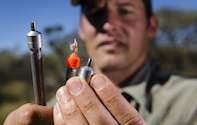
The hunter stalks his prey, a huge elephant bull. He stops, a shot is fired. The shot is a good one, but the elephant doesn't drop immediately. Instead he wanders on for a few more minutes until he falls to earth.
The big difference between this scenario and many others is that the hunter never fired a bullet - he fired a dart containing a knockout drug.
When the elephant succumbs to the sedative, he can be measured, casts taken of his tusks and the hunter can have his photo taken. Optional extras include the fitting of a tracking collar to the elephant, allowing a researcher to monitor the bull's movements over a period of time.
This is 'green hunting' or a 'darting safari', a concept pioneered in elephants by elephant guru Iain Douglas-Hamilton, and first practised in the Timbavati Private Nature Reserve alongside Kruger National Park (KNP). The idea was presented to the Timbavati members to great acclaim by Marlene McCay, from Save the Elephants South Africa.
From the time the first elephant bull was darted by a hunter in 1998, the Timbavati has not lethally hunted elephants. Iain says, "The idea is to provide an ethical alternative to lethal hunting." He hopes that eventually all elephant hunts will be green hunts carried out in a strictly controlled fashion, with a link to scientific research. He points out that increasingly people are reluctant to kill conscious animals, such as gorillas, chimps, dolphins and whales, and feels that elephants deserve the same rights.
Iain points out a parallel with deep-sea fishing, where the technique of capture, tag and release is successfully used. He describes green hunting as "no pushover", and that the quality of the experience equals or exceeds that of a lethal hunt. He says that while he was uneasy about the lethal hunting of elephants, he was also uneasy about condemning hunting altogether, pointing out that many of the best conservationists started their lives as hunters.
The concept is gradually becoming better known in hunting circles and in the public eye. Marlene and Iain have both made presentations to members of the exclusive international Shikar hunting club, who received the concept well and accepted green hunting as a form of hunting.
Other animals have now been green hunted, such as rhino and lions. The system is open to abuse, with the possibility of small reserves branding themselves as 'green', and then repeatedly darting the same animal until it dies of a drug overdose.
In 2003, the Department of Environmental Affairs and Tourism sent around an inter-office memo to give a framework to regulatory services who deal with permit applications for green hunting. They required the hunt to be recorded by the professional hunter as a normal hunt with appropriate permits, and that a qualified vet should prepare the darts and accompany the hunt until the animal is fully recovered.
Animals without existing microchips should also be fitted with a microchip and the number given to the permit office. Long photo sessions are also considered and discouraged by the memo. The department also reserves the right to be present during the hunt. Any animal can only be green hunted once in a year.
Green hunting has seen the fitting of satellite tracking collars to several elephants in the Timbavati, including one large bull who has been shown to move between Kruger and Timbavati in one of the largest known home ranges of any African elephant.
The green hunting of an elephant has several advantages, including not disrupting elephant social structure by removing prime bulls, allowing old bulls to mate and pass on the genes for big tusks, and brings in money for conservation and communities. Iain says that he hopes eventually that green hunting will totally replace lethal hunting of elephants, leaving "living, breathing, walking, mating" trophy animals.
By Melissa Wray

 Dr Michelle Henley was smiling in delight at being reunited with the first elephant collared in her ambitious project to learn more about el...
Dr Michelle Henley was smiling in delight at being reunited with the first elephant collared in her ambitious project to learn more about el...